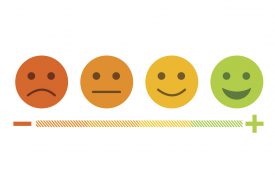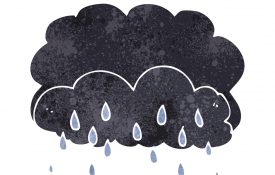-
When Guilt Is Good
A few years ago, researchers in Germany set out to plumb the moral consciences of small children. They invited a series of 2- and 3-year-olds to play with a marble track in a lab. Close to the track—inauspiciously close—was a block tower that one of the adult experimenters claimed to have painstakingly constructed. Just before turning her back, she asked them not to damage it. Needless to say, the game was rigged. After a few runs, a marble would knock over part of the tower, at which point the experimenter responded with what the resulting journal article described as a “mildly sad” tone. “Oh no,” she would say, then ask what had happened.
-

The Emotions We Feel May Shape What We See
Findings from two experiments suggest that our emotional state in a given moment may influence how we perceive visual stimuli.
-

Lingering Negative Responses to Stress Linked With Health a Decade Later
People who respond to stress with negative emotions that carry over from one day to the next report more health problems 10 years later compared with peers who are able to “let it go.”
-
Homework Therapists’ Job: Help Solve Math Problems, and Emotional Ones
On a recent Sunday, Bari Hillman, who works during the week as a clinical psychologist at a New York mental health clinic, was perched at a clear, plastic desk inside a 16-year-old’s Manhattan bedroom, her shoeless feet resting on a fluffy white rug. Dr. Hillman was helping a private school sophomore manage her outsize worry over a long-term writing project. The student had taped the project outline on the wall above the desk, at Dr. Hillman’s prodding. It was designed to serve both as a reminder that the project was due, and an empowering indicator of progress. Dr.
-
People can’t be educated into vaccinations, but behavioral nudges help, study finds
Vaccines were one of the great inventions of modern history. They helped stop America’s polio epidemic in the 1950s, when it was paralyzing thousands and killing at least 3,000 a year. They have prevented the deaths of millions worldwide from diseases such as diphtheria, smallpox, measles and tetanus. And yet many people are reluctant to get their shots or vaccinate their children. A study published Wednesday concludes that using education campaigns, and simply trying to persuade people to get the shots, is far less effective than using indirect behavioral nudges.
-
Why Do Some People Get Sick Less Often?
You know who you are: the person who had perfect attendance, the one who never gets the nasty cold going around the office. Some people seem to be immune to whatever’s taking hold of their friends and neighbors, while others move from one bout of cold to another with little reprieve. Two experts, Sheldon Cohen, a professor of psychology at Carnegie Mellon University in Pittsburgh, and Robert Atmar, a professor of medicine in the Section of Infectious Diseases at Baylor College of Medicine in Houston, explain how your family’s home ownership during early childhood may come into play and why loners may fare worse.

